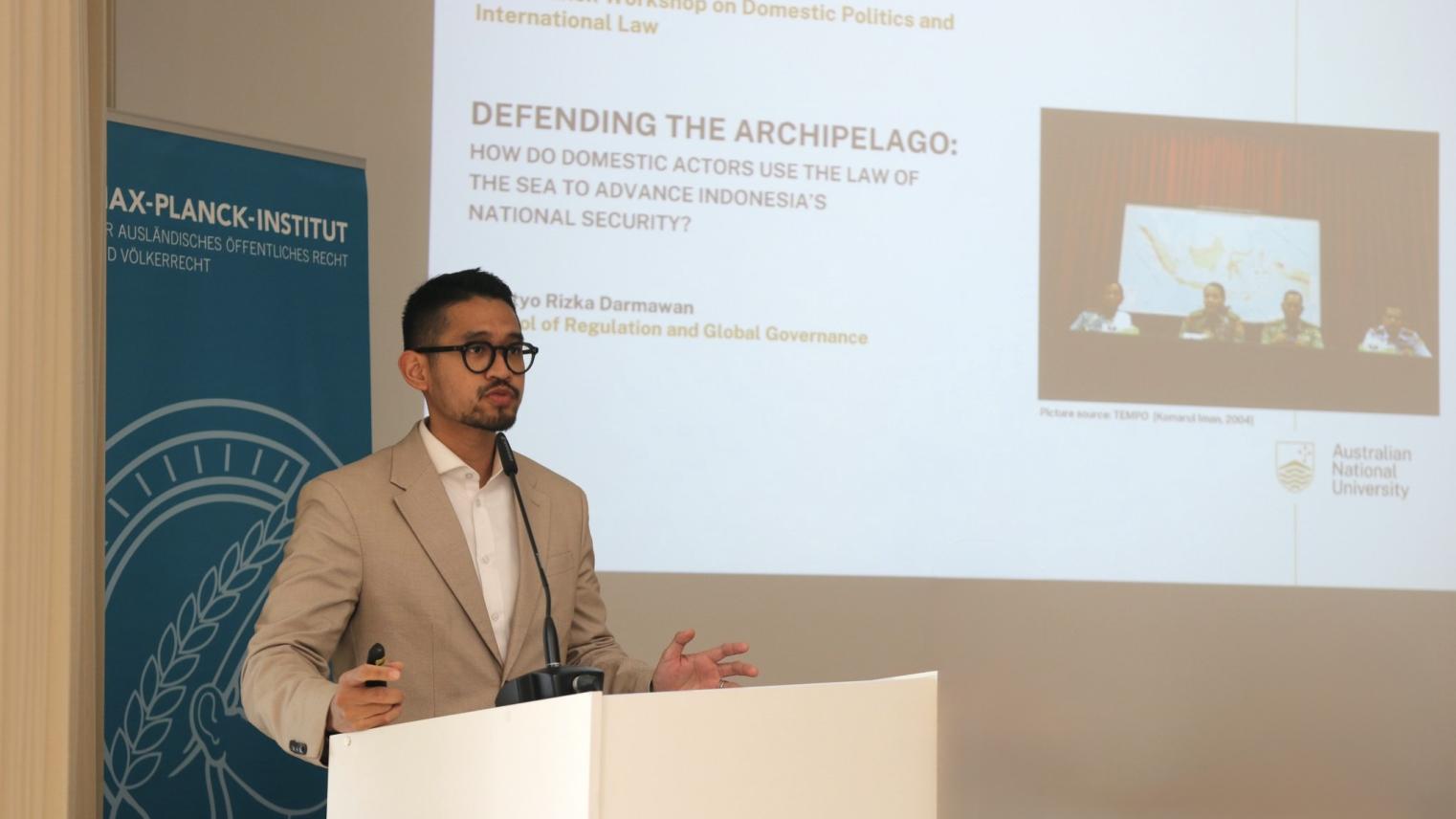PhD spotlight: Meet Aristyo Darmawan

Aristyo Rizka Darmawan is a third-year PhD scholar at the ANU School of Regulation and Global Governance (RegNet). Born and raised in Jakarta, Indonesia, Aristyo had always been passionate about how international law shapes geopolitics and international relations, especially in maritime affairs and security. Over the past few years, he has researched and written about the South China Sea dispute and maritime security issues in Southeast Asia. He shares his story in this Q&A.
Tell us a little about yourself
My name is Aristyo and I’m a third-year PhD student at RegNet. Before starting my PhD, I completed my master's at the Fletcher School of Law and Diplomacy at Tufts University in Medford, Massachusetts, where I explored the interdisciplinary aspect of international law and maritime studies. After graduating, I returned to Jakarta to teach international law at Universitas Indonesia and chose a career in academic for the flexibility it offers to pursue my research interests.
I am also interested in discussion and debate beyond academia. I write for academic journals, newspapers, op-eds and think tank policy commentary. This allows me to connect with scholars, policymakers and analysts regionally and globally.
What inspired you to pursue a PhD?
Having observed and interacted with Indonesian government legal advisors in different capacities, I have became fascinated by how international law works in practice, particularly through the work of government lawyers. That’s what got me interested in doing interdisciplinary research to understand this. ANU was a natural choice because it is known globally for its expertise in Southeast Asian studies. I think its pool of expertise, made up of professors and scholars with deep, grounded knowledge, has no rival. RegNet has a strong reputation for interdisciplinary research that tackles some of the world's most pressing challenges.
I think I couldn’t ask for better supervisors and panels for my interdisciplinary research. My Chair, RegNet’s Professor Veronica Taylor, is an expert in socio-legal methodology. Her expertise and wisdom have been instrumental in helping me design my project using qualitative social science methods to understand a legal issue. Professor Donald Rothwell (ANU Law School) is a world expert on the law of the sea, and Professor Marcus Mietzner (ANU Coral Bell School of Asia Pacific Affairs) is a leading expert on Indonesian politics. All my supervisors are very generous with their time and expertise, supporting me to do my best in my research and opened so many opportunities to build my skills and knowledge in the field.
How has your experience at RegNet shaped your learning and research journey so far?
RegNet is an excellent place to do interdisciplinary research. It has fantastic professors and scholars from diverse backgrounds, including international law, sociology, health and more. This wide range of expertise provides students with invaluable insight and opportunities to learn from one another. The weekly seminar series has also exposed me to new knowledge and expertise I may not have gained otherwise.
What has been the most challenging part of the PhD journey to date?
Doing a PhD is much more than just doing my own research; it is a family journey too. Moving to Canberra with my family involved a lot of adjustment and responsibility. Therefore, balancing my research project with family life is a real challenge. Juggling classes, supervisor meetings, teaching obligations and picking up my daughters from childcare or school isn’t always easy, but it’s definitely manageable.
How do you stay motivated?
As a scholar, I have always wanted to write my first book monograph. So right from the start, I made it clear to my supervisors that I hoped to turn my PhD research into a book, and they've been amazingly supportive of that idea. I’m also genuinely interested in the topic I’m working on. It’s something I really want to understand better, so that curiosity has kept the research process engaging and meaningful.
Who has been your source of support?
My family has always been my source of support and motivation. Being in Canberra with my wife and our wonderful five-year-old daughters has been a constant source of support and encouragement throughout my research. I’m grateful for their continuous support over the years we’ve spent here.
What are you most looking forward to in the next phase of your PhD?
I recently completed my Mid Term Review in late May, so I am now focused on wrapping up my research and getting it ready for submission. Ultimately, I’m really looking forward to attending the ANU commencement and celebrating with my family and friends, hopefully wearing my PhD regalia and taking lots of photos!
What advice would you give to someone just starting their PhD or to those midway through like yourself?
My advice for anyone just starting their PhD journey or thinking about applying is to choose a topic you’re really interested in. Pick a research question or puzzle you’re curious about, something you are willing to spend three to four years exploring. That curiosity makes the journey far more interesting and fulfilling. A PhD is a long journey, so it’s important to have a strong support system. Whether it’s family, friends, or a community that keeps you grounded, having that support makes all the difference.
Build good relationships with your supervisors and panel members. They offer invaluable guidance, and these relationships can open doors to opportunities in developing your academic career.
Lastly, doing a PhD is a tough and long journey, but it is also incredibly fulfilling and rewarding. Enjoy all the ups and downs, stay focused, motivated and even being in love with your project can really make a big difference in the journey.